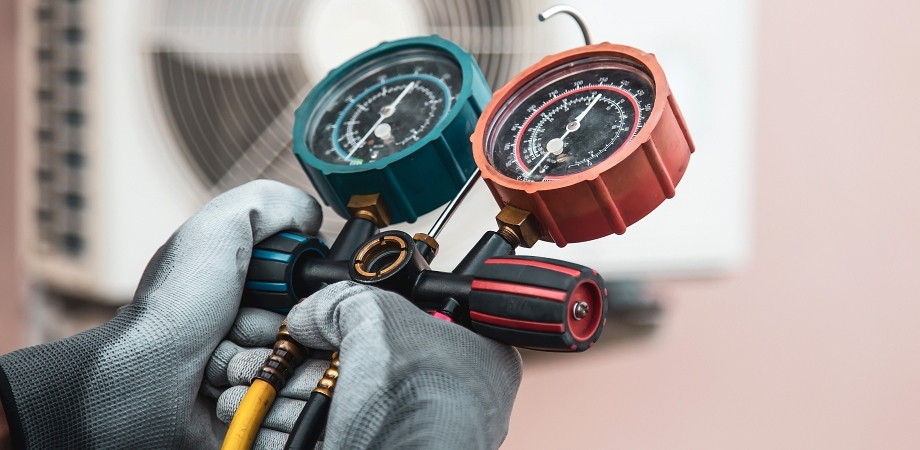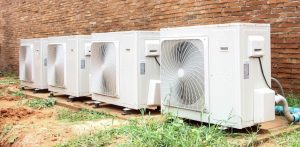
If you are looking for a technical career in high demand, you might consider working in air conditioning and electrical technology. Training is available for this dual career at excellent technical colleges in your area.
The better programs provide knowledge and skills in air conditioning, refrigeration, and electrical technology, more commonly called HVAC. Students prepare to take industry certification exams while in school to expand their professional qualifications.
Air Conditioning & Electrical Technology Job Duties
Technicians in air conditioning and electrical technology work primarily in two capacities: repair technicians and new construction installers. This is what their typical job duties look like:
 Repair Technician: Repair technicians provide a range of necessary services on existing HVAC and electrical systems for home and business owners. They respond to customer calls to troubleshoot issues, repair equipment, clean systems, replace parts or equipment, and provide helpful user information.
Repair Technician: Repair technicians provide a range of necessary services on existing HVAC and electrical systems for home and business owners. They respond to customer calls to troubleshoot issues, repair equipment, clean systems, replace parts or equipment, and provide helpful user information.
New Construction Installers: New construction installers work on residential, commercial, and industrial job sites. They are the first technicians to work with HVAC equipment and systems in new homes and buildings. They install furnaces, air conditioners, ductwork, thermostats, heat pumps, and other equipment as required. If they are electricians, they install new wiring systems in homes and businesses.
Other positions include ductwork installers, ventilation technicians, maintenance contract sellers, and in-house retail or wholesale sales associates each with their own set of job duties.
Train With A College Degree
Employers look for HVAC technicians with a broad understanding of the field and all-around skills to tackle a variety of jobs. Potential technicians should obtain an associate degree, obtain some practical experience, and become certified in the industry. A degree provides these skills:
- Entry-level service skills as maintenance technicians in heating, ventilation, air conditioning, and refrigeration.
- Electrical skills of installing, repairing, and maintaining a variety of electrical equipment.
- Preparation to pass the EPA section 608 test in Louisiana for HVAC work.
- Understanding of basic HVAC concepts, skills, knowledge, and terminology.
- Fundamentals of heat transfer, refrigerants, basic electricity, circuitry, and regulations governing HVAC systems.
- Electrical safety, motor controls, basic and advanced programmable logic controllers (PLCs), and the National Electric Code (NEC.)
- Safe work practices and environmental awareness and practice.
Graduates will have a working knowledge of and skills in AC load calculations, applications, and troubleshooting of heating, air conditioning, and refrigeration systems, wiring methods, and lighting. They will also develop skills in personal computer office applications, computer networking, workplace communication, and one elective course related to each student’s interests.
|
“If you are looking for a technical career in high demand, you might consider working in air conditioning and electrical technology.” |
Beyond An HVAC Associate Degree: Air Conditioning & Electrical Technology Certification
Certifications in any industry are gateways to success and recognize technicians as experts in their field. They lead to more and better job opportunities, higher pay, and credibility in the field of HVAC. These are the most sought-after certifications:
- EPA 608 Certification is mandated by the Environmental Protection Agency (EPA) for HVAC technicians. It is a special qualification for those who work with refrigerants for air conditioners and refrigeration units.
- HVAC Excellence Certification validates technicians’ proficiency and dedication, which holds significance for employers and clients. Passing rigorous training and exams shows they demonstrate mastery in system design, installation, diagnostics, and maintenance. It shows technicians can perform high-quality work and adhere to industry standards.
- North American Technician Excellence (NATE) Certification indicates excellence and proficiency in specific areas of HVAC systems. It builds trust with clients and employers and shows technicians’ dedication to industry standards and regulations. Employers tend to prefer hiring NATE-certified technicians for their proven skills and reliability.
- Refrigeration Service Engineers Society (RSES) Certification is a prestigious credential for technicians who want advanced expertise working with refrigeration and air conditioning systems. RSES certification equips technicians to work confidently with complex refrigeration challenges. This certification shows dedication to professional growth as leaders in refrigeration technologies.
- HVAC/R Certification covers essential skills and knowledge necessary for several HVAC career paths. It empowers technicians with a strong and versatile skill set to take on challenges with confidence. This certification is esteemed within the HVAC community because it demonstrates a commitment to mastering HVAC/R systems, industry standards, and safety protocols.
Obtain Your Air Conditioning & Electrical Technology Training At ITI Technical College
What better way to train for a career in air conditioning and electrical technology than to earn the Air Conditioning, Refrigeration, & Electrical Technology (AOS) Associate in Occupational Studies Degree from ITI Technical College. The Program is accredited by HVAC Excellence. This designation ensures that it meets the rigorous standards and contains the necessary resources for high-quality education. Contact ITI Technical College for more information about our Air Conditioning & Electrical Technology Certification.
For more information about graduation rates, the median debt of students who completed the program, and other important information, please visit our website: https://iticollege.edu/disclosures/




